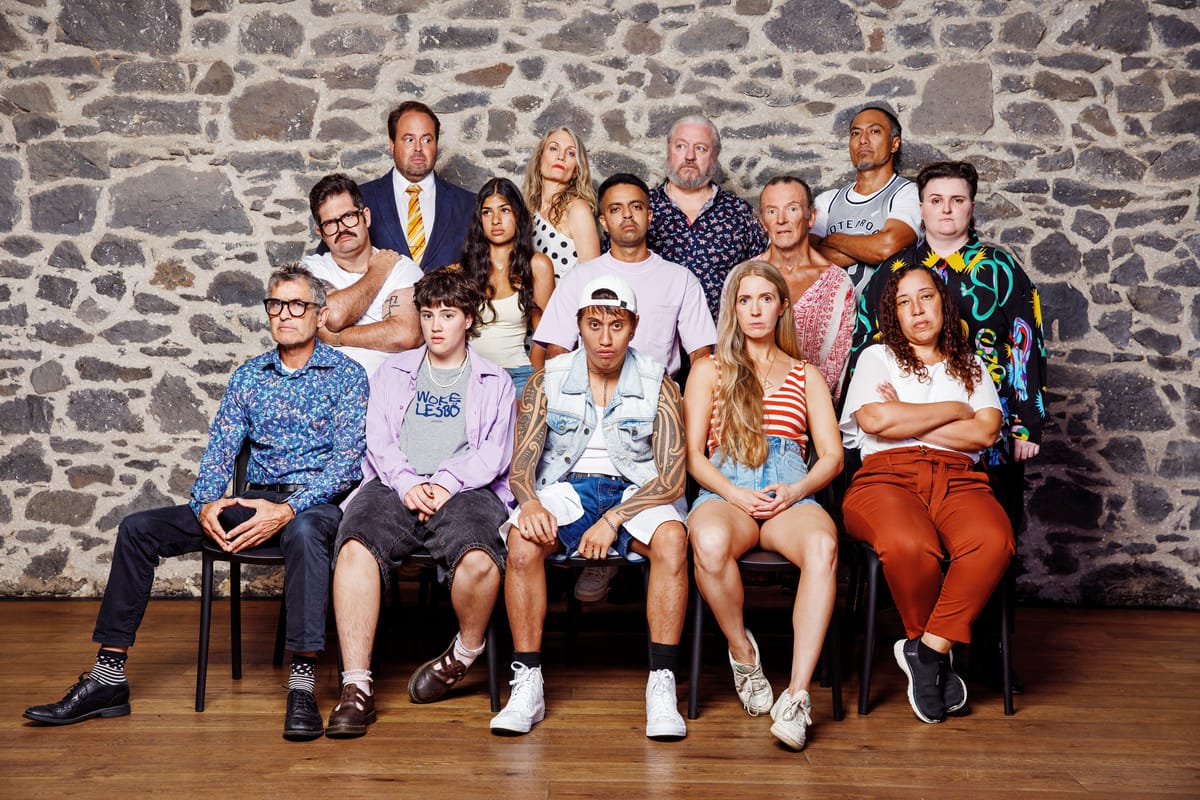REHAB Returns: A Dark Comedy Breaking the Stigma Around Addiction
Creator Elizabeth Cracroft and performer Dorsa Nassiry share how this improvised dark comedy normalises recovery, connects audiences to real stories, and transforms perspectives on addiction.

A mix of chaos, honesty, and raw vulnerability, REHAB storms back for its seventh season in Auckland, running 22–25 October at The Pumphouse Theatre.
Since its 2021 debut, REHAB has become one of Auckland’s most transformative shows — praised for breaking the stigma around addiction through laughter, unfiltered honesty, and dynamic performances.
Craccum sat down with creator and producer Elizabeth Cracroft, a criminal defence lawyer who has been sober for 16 years since the age of 24, and performer Dorsa Nassiry, at just 20, a returning cast member playing Yasmin and representing younger voices in the world of recovery, to talk about the upcoming season and the kaupapa behind this improvised dark comedy.
Finding REHAB
Dorsa first met Elizabeth in an acting class where she approached her about the show . Much like Rehab, Dorsa was the youngest person in the class and was ecstatic to have been asked to be a part of anything. It wasn’t until a little later, during a phone call, where Dorsa heard Elizabeth speak about the roots of the show and how it’s all based on her own experience with addiction and recovery. "That was definitely the moment that truly drew me in." Dorsa says.
For Elizabeth, creating the show was a way to confront the shame and isolation she experienced in active addiction and attending residential rehab as a young student studying communications. “When I got sober, there was a lot of stigma around dealing with substance addiction and going to rehab, especially for young people,” she recalls.
Dorsa adds that the opportunity to join the cast offered her a space to contribute her perspective as a young performer, and to help make conversations about addiction and recovery relatable.
Normalising Recovery
When asked to describe REHAB to someone who hasn’t seen it, both Elizabeth and Dorsa highlight its mission to normalise recovery. “Addiction doesn’t discriminate — it can affect anyone,” Elizabeth shares. This belief shapes the show’s diverse cast, which spans ages, ethnicities, and life experiences, including Māori, Samoan, Pākehā, Indian, Persian, and South African heritage.
“In my experience, dealing with addiction as a young person can be tough. When I finally came into a recovery at 24, I sort of felt like bit of an outsider compared to others my age. Active addiction separates you initially and then going off to rehab, living clean and sober, attending heaps of recovery meetings was a little foreign to my peers,” Elizabeth continues, “the drinking culture in New Zealand also tends to perpetuate that. Although, in saying that, I've always respected the fact that all because I needed to get sober, didn’t mean other people needed to as most folk don’t have a substance addiction"
For Dorsa, an important part of her role is bringing a younger voice into the conversation around recovery. “I think just showing that recovery journeys can start young too,” she says, noting that you don’t have to be 40 and in the midst of a divorce to be an alcoholic — it’s a story that looks different for everyone. In preparing for the show, she and the team sat in on recovery meetings and saw people from all walks of life, including many her age. For her, it’s really important to show that perspective and help audiences understand that addiction can affect anyone, regardless of age. At the same time, she’s mindful of protecting the integrity of her character: Yasmin isn’t just “the young one,” but someone with her own "personality and quirks", and Dorsa makes a point of letting those shine through rather than letting her fall into stereotypes.
For Elizabeth, the show is also inspired by her new career as a criminal defence lawyer. “Anecdotally, clients often appear to be dealing with some form of substance abuse,” she says. “Sometimes their interaction with the justice system can allow a crossroad that may lead to recovery or at least plant a seed for future change.”
Elizabeth is also a Trustee and secretary of Te Hapori Charitable Trust, which serves as the community advisory group for Te Whare Whakapiki Wairua, The Alcohol and Other Drug Treatment Court, (AODTC.) “The AODTC is a strong example of the justice system providing meaningful intervention for addiction driven offending. It is a long process for whaiora, requiring hard mahi, but allows for consistent wrap around support and a pro-social, connected recovery community. From my observation, the transformations through the court are always quite remarkable.”
On Stage
Improvisation is central to REHAB, but it also demands vulnerability from the performers. Dorsa points out that the characters are anchored with us in real lived experience, which she and the cast share with the audience, giving every moment of improv emotional truth. Elizabeth observes, “Improv allows us to react to reality in real time,” which makes that vulnerability authentic for audiences
Joining a "stacked", experienced cast was initially intimidating and the most challenging moment for Dorsa. “"I walked into a room of super skilled, super talented, just really wicked improvisers", she recalls, "It was intimidating for sure but more than anything I feel so lucky to get to learn from them. I’m always completely captivated watching them bring their craft to life with such ease".
Audiences, meanwhile, often respond viscerally to the moment of raw honesty and vulnerability. Dorsa remembers one audience member saying, “I was laughing, but I don’t know why I started crying.” Both Dorsa and Elizabeth light up when speaking about these reactions. For them, it’s about audiences leaving the theatre feeling changed, or "transformed", as Elizabeth puts it. Perhaps, this sense of 'transformation' echoes the heart of their kaupapa: building connection between the audience and the characters, and opening a new understanding of recovery.
When asked how she supports the cast, especially younger performers like Dorsa, Elizabeth stresses the importance of both authenticity and care. “We work with the cast to create devised characters that are authentic to addiction and early recovery,” often inspired by stories she and her recovery friends have shared with the cast.
But the actor’s also bring parts of their own diverse life experiences into their respective characters,” she explains. Aspects of the show are also guided by alcohol and drug clinicians, many close friends of Elizabeth.
Elizabeth believes that it’s always at the actors’ discretion how much of themselves they want to reveal. “They have full license — some make it more fictional, others bring more of their own experiences. Characters can evolve from season to season, and that’s completely up to them.” She adds, “However the thing that is consistent is the character’s authenticity to addiction and recovery.”
Support goes beyond the stage, too. Elizabeth regularly checks in with her cast, making herself available during rehearsals and after shows. “Especially with younger performers, I think it’s important they know the lines of communication are always open. They can talk to me about anything, and I will always support them. And if they need extra help, I can connect them with the right resources.”
Looking Ahead
Both Elizabeth and Dorsa are excited to continue spreading the kaupapa of REHAB and normalising conversations around recovery. "Recovery doesn’t have to be big and scary and full of shame, it’s possible, and you’re not alone." Dorsa shares.
Elizabeth adds that accessibility is also key: “The tickets are pay-what-you-like from $12. We just want as many people as possible to come, hear the message, and engage with our kaupapa.”
Craccum would like to thank Dorsa and Elizabeth for taking the time to chat with us and share the story behind REHAB.
REHAB runs at The PumpHouse Theatre in Auckland from Wednesday 22 to Saturday 25 October, with performances at 7 pm. Tickets are available now.







